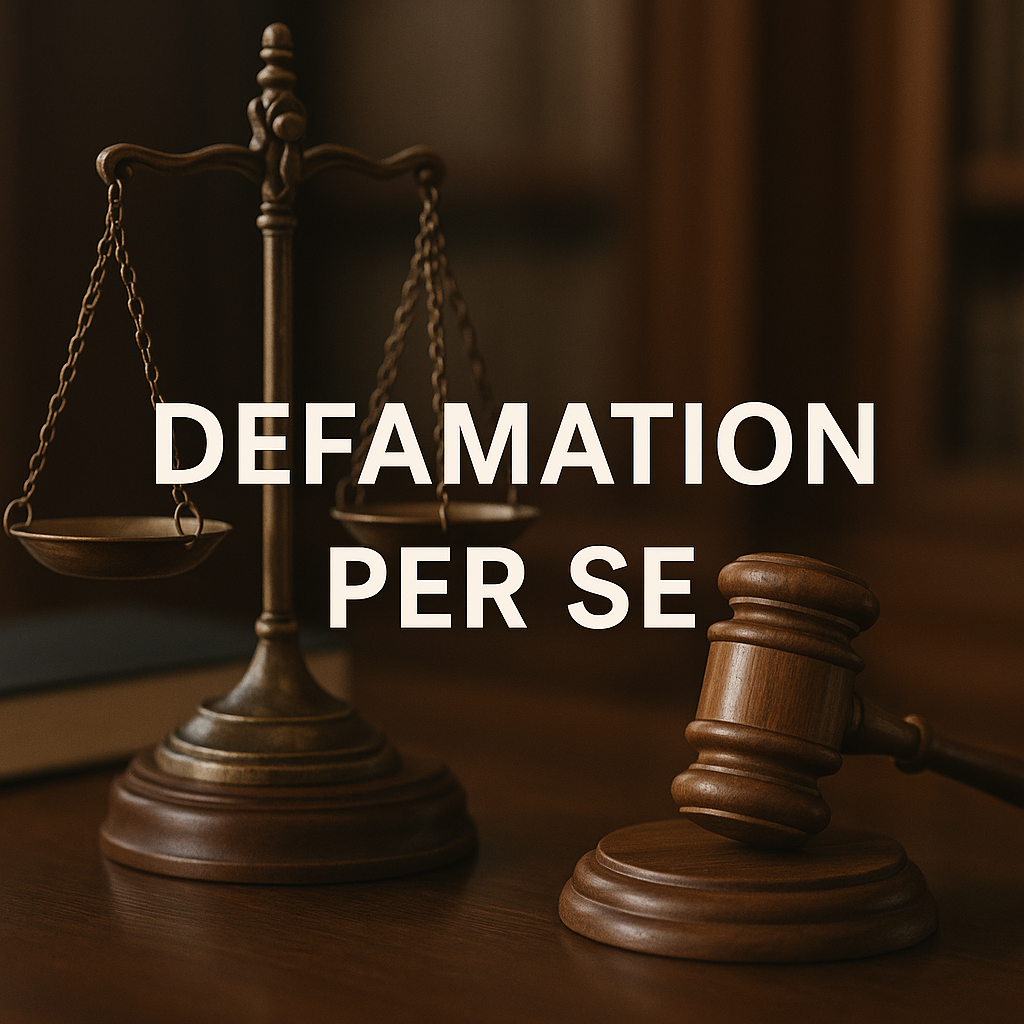
In Texas, a person’s reputation carries real legal weight. When someone spreads false statements that damage your good name, you may have a claim for defamation. But not all defamation cases are created equal — some statements are considered so inherently harmful that damages are presumed. These are known as defamation per se.
Defamation vs. Defamation Per Se
At its core, defamation under Texas law involves a false statement that is published to a third party and causes injury to another’s reputation. The plaintiff must generally prove:
- The defendant published a statement;
- The statement was defamatory;
- The statement was false;
- The defendant acted with negligence or actual malice (depending on the plaintiff’s status); and
- The plaintiff suffered damages as a result.
But when the defamatory statement falls into one of several special categories, the law presumes harm — this is defamation per se.
What Counts as Defamation Per Se in Texas
Texas courts recognize several categories of statements that qualify as per sedefamatory, meaning the harm is so obvious that no proof of actual damage is required. These include statements that:
● Accuse someone of a crime;
● Allege someone has a loathsome or contagious disease;
● Impugn a person’s honesty, integrity, or moral character;
● Claim someone is professionally incompetent or unethical; or
● In some cases, falsely accuse a person of sexual misconduct.
For example, falsely saying that a lawyer “stole client funds” or that a doctor “botched surgeries due to drinking” would be defamation per se — the reputational damage is presumed without further proof.
Burden of Proof
Even though damages are presumed in a per se case, the plaintiff must still prove the core elements:
● That the statement was false,
● That it was published to someone other than the plaintiff, and
● That the defendant was at least negligent in making it.
Public figures face a higher standard — they must prove actual malice, meaning the defendant knew the statement was false or acted with reckless disregard for the truth.
Truth, opinion, and privilege remain defenses. If the statement is substantially true or clearly an opinion, the claim fails. Likewise, statements made during judicial or legislative proceedings are often protected by absolute privilege.
Damages in Defamation Per Se
Unlike ordinary defamation (sometimes called defamation per quod), plaintiffs in per se cases don’t need to show actual monetary loss or specific reputational harm. The law presumes general damages, such as:
● Loss of reputation or standing in the community,
● Mental anguish, embarrassment, or humiliation, and
● Other intangible harms.
In serious cases, courts may also award punitive damages if the plaintiff proves malice or reckless disregard.
Why Defamation Per Se Matters
The distinction between per se and per quod can dramatically affect the outcome of a case. If a statement qualifies as defamation per se, it relieves the plaintiff from proving actual financial or reputational harm — often the hardest part of any defamation suit. This makes such cases more viable for plaintiffs whose injury, though real, is difficult to quantify.
Conclusion
Defamation per se recognizes that some words are so harmful they speak for themselves. But even so, proving falsity and fault remains critical under Texas law. If you believe someone has defamed you — or if you’ve been accused of defamation — understanding whether the statement qualifies as per sedefamatory can make or break your case.
At David C. Barsalou, Attorney at Law, PLLC, we help clients navigate business, family, tax, estate planning, and real estate matters ranging from document drafting to litigation with clarity and confidence. If you’d like guidance on your situation, schedule a consultation today. Call us at (713) 397-4678, email barsalou.law@gmail.com, or reach us through our Contact Page. We’re here to help you take the next step.